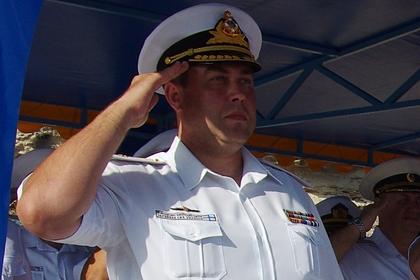The prosecutor's office of Ukraine decided to condemn in absentia the deputy head of the Pacific Fleet of the Russian Federation Berezovsky 
to convict Denis Berezovsky, Vice Admiral, Deputy Commander of the Pacific Fleet of the Russian Navy, by sending an indictment to the court. This is stated in a corresponding statement on Facebook.
Berezovsky, whose name is not indicated in the statement, is being charged with high treason, as well as the creation and leadership of a criminal organization.
The specified citizen of Ukraine in 1992 swore allegiance to the Ukrainian people, taking on the responsibility to defend Ukraine, and began military service in the Armed Forces of Ukraine
prosecutor's office of the Autonomous Republic of Crimea
The materials say that on March 1, 2014, Alexander Turchinov, who at that time was acting President of Ukraine, appointed the current Deputy Chief Commander of the Russian Federation to the post of Commander of the country's Navy.
According to national legislation, this position provides for the obligation to contain, localize and neutralize armed conflicts, and, if necessary, provide a rebuff to armed aggression from the sea, both independently and in cooperation with other units of the 3SU
Prosecutor's Office of the Autonomous Republic of Crimea
However, immediately after his appointment, he “publicly spoke to the personnel of the Ukrainian Navy and representatives of the media,” stating that he refused to carry out any decisions, orders and orders of Kiev.
According to the prosecutor’s office, such actions and decisions by Berezovsky contributed to “subversive activities against Ukraine.”
Berezovsky and Crimea
In March 2014, a significant part of the personnel of the Armed Forces of Ukraine deployed in Crimea, including military leaders, went over to the side of the authorities of the peninsula, and then Russia.
On March 1, 2014, Berezovsky was appointed Commander of the Ukrainian Navy. The day after his appointment, he switched to the side of the pro-Russian forces of Crimea and became the commander of the newly created Navy of the Autonomous Republic of Crimea.
Thus, Berezovsky refused to follow the orders of Ukraine, where the power was held by the opponents of former President Viktor Yanukovych, who fled the country … In total, in the first days of March, more than three thousand Ukrainian soldiers swore allegiance to the “people of Crimea”.
3,000 Ukrainian military swore allegiance to the “people of Crimea” March 3, 2014
On March 24, 2014, by order of the Russian Defense Minister Sergei Shoigu, he became acting deputy commander of the Black Sea Fleet. In April, Russian President Vladimir Putin signed a decree according to which the former Commander-in-Chief of the Ukrainian Navy Denis Berezovsky was approved as Deputy Commander of the Black Sea Fleet of the Russian Navy.
Related materials20: 52 – March 15, 2015  “We supported our own” Putin disclosed the details of the operation to annex Crimea00: 04 – 16 March 2019 How Crimea became part of Russia. The main participants of the “Crimean Spring” tell the accusations of Kiev
“We supported our own” Putin disclosed the details of the operation to annex Crimea00: 04 – 16 March 2019 How Crimea became part of Russia. The main participants of the “Crimean Spring” tell the accusations of Kiev
After going over to the side of the pro-Russian forces of Crimea, the General Prosecutor's Office of Ukraine opened a criminal case against Berezovsky. The case was initiated under Article 111 of the Criminal Code (“high treason”). He was removed from office by order of Turchinov.
In March 2016, the chief military prosecutor of Ukraine, Anatoly Matios, announced that two former defense ministers of the country, Mikhail Yezhel and Pavel Lebedev, were put on the wanted list. In addition, the former Chief of the General Staff and Commander-in-Chief of the Armed Forces of Ukraine (AFU) Yuriy Ilyin, Commander of the Naval Forces (Navy) Denis Berezovsky, Deputy Commanders of the Navy Dmitry Shakura and Sergei Eliseev were put on the wanted list. They were charged with desertion.
Crimea as part of Russia
Crimea became part of Russia in March 2014 after a referendum in which the overwhelming majority of those who voted in the region supported such a decision. Ukraine, the EU countries and the United States refused to recognize the results of the vote, calling the reunification of the peninsula with mainland Russia an annexation. The Russian authorities reject these charges and insist that the accession procedure was in accordance with international law.